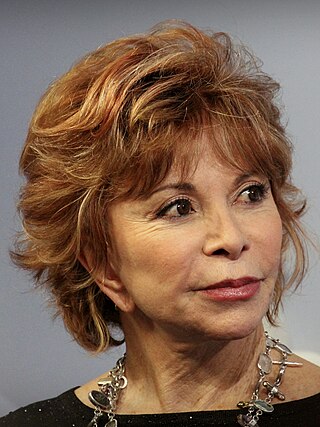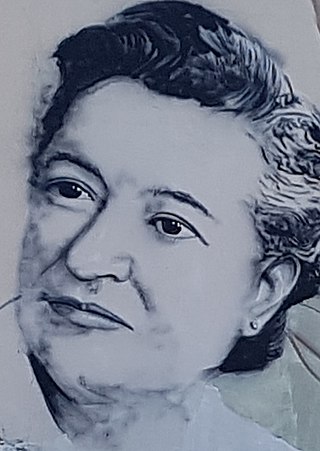Related Research Articles

Isabel Angélica Allende Llona is a Chilean-American writer. Allende, whose works sometimes contain aspects of the genre magical realism, is known for novels such as The House of the Spirits and City of the Beasts, which have been commercially successful. Allende has been called "the world's most widely read Spanish-language author." In 2004, Allende was inducted into the American Academy of Arts and Letters, and in 2010, she received Chile's National Literature Prize. President Barack Obama awarded her the 2014 Presidential Medal of Freedom.

Lucila Godoy Alcayaga, known by her pseudonym Gabriela Mistral, was a Chilean poet-diplomat, educator, and Catholic. She was a member of the Secular Franciscan Order or Third Franciscan order. She was the first Latin American author to receive a Nobel Prize in Literature in 1945, "for her lyric poetry which, inspired by powerful emotions, has made her name a symbol of the idealistic aspirations of the entire Latin American world". Some central themes in her poems are nature, betrayal, love, a mother's love, sorrow and recovery, travel, and Latin American identity as formed from a mixture of Native American and European influences. Her image is featured on the 5,000 Chilean peso banknote.
Violeta del Carmen Parra Sandoval was a Chilean composer, singer-songwriter, folklorist, ethnomusicologist and visual artist. She pioneered the Nueva Canción Chilena, a renewal and a reinvention of Chilean folk music that would extend its sphere of influence outside Chile.

Kudai are a Chilean pop rock band from Santiago, Chile, formed in 2003. The group is composed of Pablo Holman, Bábara Sepúlveda, Tomás Manzi, and Nicole Natalino, who left the group in 2006 citing personal reasons, and was replaced by Ecuadorian Gabriela Villalba for three years. After the group disbanded in 2010, in November 2016, the band confirmed their return to the scene with the original members.

Latin American literature consists of the oral and written literature of Latin America in several languages, particularly in Spanish, Portuguese, and the indigenous languages of the Americas. It rose to particular prominence globally during the second half of the 20th century, largely due to the international success of the style known as magical realism. As such, the region's literature is often associated solely with this style, with the 20th century literary movement known as Latin American Boom, and with its most famous exponent, Gabriel García Márquez. Latin American literature has a rich and complex tradition of literary production that dates back many centuries.

Mercedes Valdivieso was a Chilean writer, known since her earliest writings for the subversive nature of her texts. She was born in Santiago, Chile. She first wrote La Brecha (Breakthrough) in 1961, which is considered to be a landmark feminist Latin-American novel. This novel caused dismay from the reactionary segment of society and loud applause from the critics and is considered a revolutionary departure from the traditional treatment of the feminine role in marriage. Breakthrough is a novel that ends with the heroine's awareness that she didn't really need to depend upon a man in order to lead a fulfilling life. The book enjoyed an unexpected publishing success and went through five consecutive editions. Mercedes Valdivieso had the extreme audacity to become an innovator; she bridged the gap between romantic and domestic fiction in a society where women have been viewed as a sexless gender, icons of virtue, and depending on men to meet the necessities of life. Valdivieso also was founder and director of Adan, a men's magazine, and Breakthrough, a feminist publication, she published articles in newspapers and magazines and she gave many lectures and speeches. She taught literature at the University of Peking, at the University of Houston, at Stephen F. Austin State University in Nacogdoches, at University of St. Thomas in Houston and she was a Professor Emeritus at Rice University.
Blanca Leonor Varela Gonzáles was a Peruvian poet. Daughter of writer, poet, singer and journalist Serafina Quinteras.

Chilean literature refers to all written or literary work produced in Chile or by Chilean writers. The literature of Chile is usually written in Spanish. Chile has a rich literary tradition and has been home to two Nobel prize winners, the poets Gabriela Mistral and Pablo Neruda. It has also seen three winners of the Miguel de Cervantes Prize, considered one of the most important Spanish language literature prizes: the novelist, journalist and diplomat Jorge Edwards (1998), and the poets Gonzalo Rojas (2003) and Nicanor Parra (2011).

Fernando Santiván was a Chilean writer renowned for winning the Chilean National Prize for Literature in 1952.

Carmen Conde Abellán was a Spanish poet, narrative writer and teacher. In 1931 she founded the first Popular University of Cartagena, along with her husband Antonio Oliver Belmás. She was also the first woman to become an academic numerary of the Real Academia Española, where she delivered her induction speech in 1979.

Amanda Labarca Hubertson, was a Chilean diplomat, educator, writer and feminist. Her work was directed mainly at improving the situation of Latin American women and women's suffrage in Chile.

Juliette Roche (1884–1980), also known as Juliette Roche Gleizes, was a French painter and writer who associated with members of the Cubist and Dada movements. She was married to the artist Albert Gleizes.

Elena Arizmendi Mejía was a Mexican feminist who established the Neutral White Cross to care for casualties of the Mexican Revolution that the Red Cross would not aid. Participating in the first wave of Mexican feminism, she established two international women's rights organizations: the "Mujeres de la Raza" and the International League of Iberian and Latin American Women.

Monica Echeverría Yáñez was a Chilean journalist, writer, actress and a Literature professor. She defined herself as a feminist since "before people called it that" and called herself a "rebel" and "anarchist" in the face of the neoliberal economic course of the Chilean government.
Stella Corvalán Vega was a Chilean writer and poet. She mainly explored the genre of poetry ascribing itself to an aesthetic stance close to surrealism. She is included together with Homero Arce, María Elvira Piwonka, Mila Oyarzún, and others in the group of writers known as the Generation of '38.
Matilde Ladrón de Guevara was a Chilean poet, feminist, and writer. She was a member of her country's Generation of '50, which also included Marta Jara, Elisa Serrana, Elena Aldunate, and Mercedes Valdivieso.

Patricia Paola Fernández Silanes, better known as Nona Fernández, is a Chilean actress, author, and screenwriter. She is a recipient of the Sor Juana Inés de la Cruz Prize, and the Altazor prize.
Ana Victoria Jiménez is a Mexican feminist, photographer, editor, and activist, that actively participated in the second wave of Mexico's feminist movement. She is best known for her archive, Archivo Ana Victoria Jiménez, which contains photographs, posters, and flyers that demonstrated or related to women activism in Mexico.

Minerva Bussenius, known professionally as Roberta Arnold, was an American stage and silent film actress. She started in Los Angeles before moving to New York, appeared in leading roles in several Broadway plays and received positive reception.
Cecilia Domeyko is a Chilean-American author, journalist, filmmaker, former broadcaster, and philanthropist based in Washington, D.C. She is the president and founder of Accent Media as well as the founder and director of the Mariposa Cultural Foundation. Her filmmaking career has become noted for winning awards and working with high-profile organizations including Univision, AARP, the Catholic Church, and the World Bank. Domeyko's career has been largely focused on raising cultural awareness and educating the international community through her films and authorship.
References
- 1 2 Martin, Gerald (1984). "The literature, music and art of Latin America, 1870-1930". In Leslie Bethell (ed.). The Cambridge History of Latin America. Cambridge University Press. p. 522. ISBN 978-0-521-23225-8.
- 1 2 Jill Nelmes; Jule Selbo (2015). Women Screenwriters: An International Guide. Springer. p. 875. ISBN 978-1-137-31237-2.
- 1 2 3 Eliana Jara Donoso, Gabriela von Bussenius Vega. In Jane Gaines, Radha Vatsal, and Monica Dall’Asta, eds., Women Film Pioneers Project, 2013.